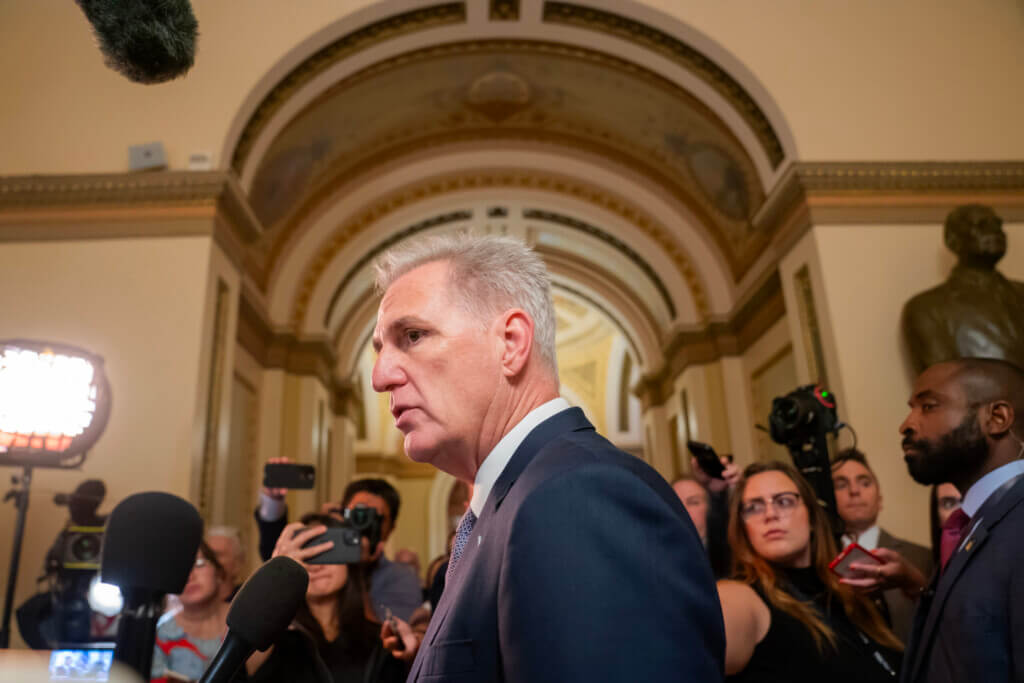In a historic turn of events, the U.S. House of Representatives witnessed an unprecedented vote to remove Kevin McCarthy as House Speaker. The 216-210 vote, which took place on Tuesday, marked the first time in history that the House has formally removed a sitting speaker. This extraordinary development followed months of growing dissent among a small group of House Republicans, leading to a motion to “vacate the chair” filed by Florida Republican Rep. Matt Gaetz.
The Dissident Republicans
A coalition of eight Republican representatives, including Gaetz, Andy Biggs, Ken Buck, Tim Burchett, Eli Crane, Bob Good, Nancy Mace, and Matt Rosendale, aligned with Democrats to vote in favor of removing McCarthy. This alliance represented a stark division within the GOP, with some members criticizing McCarthy for perceived breaches of promises to conservatives, such as compromising with President Joe Biden on key issues like government spending and debt.
Recommended: Who Will Replace Dianne Feinstein in the Senate?
The Uncharted Territory
Following the vote, the House entered uncharted territory as it grappled with the fallout of McCarthy’s removal. North Carolina Rep. Patrick McHenry was named speaker pro tempore, temporarily filling the leadership vacuum. House Democrats, in a surprising move, unanimously voted to declare the office of the speaker vacant, signalling their readiness for a new era of leadership in the House.
Roots of Dissent
The dissent against McCarthy was rooted in his perceived failure to uphold promises made to conservative factions within the GOP. He faced criticism for cooperating with President Biden on issues like the nation’s debt ceiling and short-term government spending, which drew the ire of staunch conservatives. Furthermore, tensions escalated as questions arose about McCarthy’s alleged private deals with Biden, particularly concerning legislation to aid Ukraine and border security.
Democratic Response
House Democratic Leader Hakeem Jeffries affirmed his party’s stance by announcing that House Democrats would vote to vacate the chair. Democrats cited McCarthy’s unwillingness to distance himself from what they saw as extreme elements within the GOP as a key factor in their decision.
GOP Supporters and Critics
While McCarthy faced staunch opposition from a faction within his own party, many Republicans, including GOP Rep. Tom Cole of Oklahoma, rallied in support of McCarthy. They praised his role in averting a government shutdown and his commitment to the appropriations process. However, critics like Rep. Matt Gaetz maintained that McCarthy’s actions did not align with conservative principles, particularly on fiscal matters.
Uncertain Future
With McCarthy’s removal, the future of House leadership remained uncertain. The House would need to hold a vote to elect a new speaker, although no alternative nominee had been proposed at this time. Some speculated about potential candidates, including Majority Leader Steve Scalise, but uncertainties loomed large.
A First in History
The 216-to-210 vote will be etched in the annals of U.S. political history as a watershed moment. Never before has the House removed its leader in this manner, making it a historic and unprecedented event. This action signifies the magnitude of dissent and turmoil within the House, resulting in a seismic shift in its leadership.
The Eight Republicans Who Aligned with Democrats
In a striking display of bipartisanship, eight Republican members of the House joined ranks with 208 Democrats to support Kevin McCarthy’s removal. This alignment of political forces underscores the depth of the divisions within the Republican Party and sends a clear message about the dissatisfaction with McCarthy’s leadership.
McCarthy’s Decision Not to Seek Re-election
In the wake of the vote, Kevin McCarthy, who had served as Speaker of the House, made a significant announcement. He stated unequivocally that he would not be seeking another term as speaker. McCarthy’s decision to forgo a re-election bid for the speakership is a noteworthy development that further underscores the gravity of the situation and its implications for the future of House leadership.
Conclusion:
The removal of Kevin McCarthy as House Speaker marked a historic moment in U.S. political history, highlighting the deep divisions within the Republican Party and setting the stage for a new era of leadership in the House of Representatives. As the House navigates uncharted territory, the political landscape remains fluid, and the selection of a new speaker will undoubtedly shape the future course of congressional proceedings.
The 216-to-210 vote marked the first time in history that the House removed its leader, with eight Republicans voting with 208 Democrats to remove McCarthy. McCarthy told reporters he would not make another run for speaker.ChatGPT
- Kevin McCarthy’s Net Worth and Career: A Political Odyssey - October 4, 2023
- Unprecedented Vote Ousts Kevin McCarthy as House Speaker - October 4, 2023
- Dianne Feinstein’s Remarkable Life and Wealth: A Comprehensive Overview - September 30, 2023
